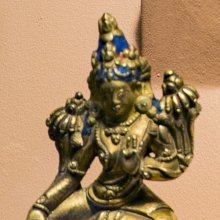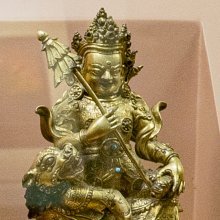Shit, Ṣit, Śiṭ, Śit, Sit, Śīt, Siṭ: 9 definitions
Introduction:
Shit means something in Hinduism, Sanskrit, Hindi, biology. If you want to know the exact meaning, history, etymology or English translation of this term then check out the descriptions on this page. Add your comment or reference to a book if you want to contribute to this summary article.
The Sanskrit terms Ṣit and Śiṭ and Śit and Śīt can be transliterated into English as Sit or Shit, using the IAST transliteration scheme (?).
Images (photo gallery)
(+112 more images available)
In Hinduism
Vyakarana (Sanskrit grammar)
Source: Wikisource: A dictionary of Sanskrit grammar1) Sit (सित्).—An affix marked with the mute letter स् (s) signifying the designation पद (pada) for the preceding base to which that affix has been added; for examples where such affixes are noticed, see the words भवदीयः, ऊर्णायुः, ऋत्वियः, पाश्र्वमू (bhavadīyaḥ, ūrṇāyuḥ, ṛtviyaḥ, pāśrvamū); cf. सिति च (siti ca) P. I. 4. 16.
2) Śiṭ (शिट्).—A term for सर्वनामन् (sarvanāman) (a pronoun) in the works of ancient grammarians; cf. स्वाङ्गशिटामदन्तानाम् (svāṅgaśiṭāmadantānām) Phit Sutra 29, where शिट् (śiṭ) is explained as सर्वनामन् (sarvanāman) in the gloss.
3) Śit (शित्).—Possessed of, or characterized by, the indicatory letter श् (ś); the krt affixes which are marked with the indicatory श् (ś) are termed Sarvadhatuka affixes (cf. P.III.4.113), while, the Adesas or substitutes, marked with the indicatory श् (ś), are substituted for the whole of the Sthanin or the original and not for its final letter according to the rule अलोन्त्यस्य (alontyasya) P. I.1.52; e. g. शि (śi) is substituted,not for the final स् (s) of जस् (jas) and शस् (śas) but for the whole जस् (jas) and the whole शस् (śas); cf. P.I.1.55.
4) Ṣit (षित्).—An affix or sometimes a word marked by the mute letter ष् (ṣ), The mute letter ष् (ṣ) attached to roots signifies the addition of the krt affix अङ् (aṅ) (अ) in the sense of the verbal activity; e. g. क्षमा (kṣamā) from the root क्षमूष् (kṣamūṣ) (क्षम् (kṣam)), जरा (jarā) from ज्ट्टष् (jṭṭaṣ) (ज्ट्ट (jṭṭa)); cf. षिद्भिदादिम्भो (ṣidbhidādimbho)Sङ् (ṅ) P. III. 3.104; attached to affixes, ष् (ṣ) signifies the addition of the fem. affix ई (ī) (ङीष् (ṅīṣ)), e. g. वराकी, शतपथिकी (varākī, śatapathikī) etc. cf. षिद्गौरा-दिभ्यश्च (ṣidgaurā-dibhyaśca) P. IV. 1.41. A few roots headed by घट् (ghaṭ) (roots from घट् (ghaṭ) to त्वर् (tvar)) are to be looked upon as षित् (ṣit) for the purpose of the addition of the krt. affix अ; e. g. घटा, व्यथा (ghaṭā, vyathā) etc. cf. घटादयः षितः । (ghaṭādayaḥ ṣitaḥ |) Gana sutra in Dhatupatha.

Vyakarana (व्याकरण, vyākaraṇa) refers to Sanskrit grammar and represents one of the six additional sciences (vedanga) to be studied along with the Vedas. Vyakarana concerns itself with the rules of Sanskrit grammar and linguistic analysis in order to establish the correct context of words and sentences.
Biology (plants and animals)
Source: Google Books: CRC World Dictionary (Regional names)Sit in Burma is the name of a plant defined with Albizia procera in various botanical sources. This page contains potential references in Ayurveda, modern medicine, and other folk traditions or local practices It has the synonym Mimosa coriaria Blanco (among others).
Example references for further research on medicinal uses or toxicity (see latin names for full list):
· Revisio Generum Plantarum (1891)
· Plants of the Coast of Coromandel (1799)
· London Journal of Botany (1844)
· The Gardeners Dictionary (1754)
· Journal of Natural Products (1998)
· Phytochemistry
If you are looking for specific details regarding Sit, for example chemical composition, diet and recipes, side effects, health benefits, pregnancy safety, extract dosage, have a look at these references.

This sections includes definitions from the five kingdoms of living things: Animals, Plants, Fungi, Protists and Monera. It will include both the official binomial nomenclature (scientific names usually in Latin) as well as regional spellings and variants.
Languages of India and abroad
Sanskrit dictionary
Source: DDSA: The practical Sanskrit-English dictionaryŚiṭ (शिट्).—1 P. (śeṭati) To slight, despise, disregard.
--- OR ---
Śīt (शीत्).—ind. A sound made to express a sudden thrill of pleasure or pain (particularly applied to the sound of pleasure during sexual enjoyment).
--- OR ---
Siṭ (सिट्).—1 P. (seṭati) To disregard, despise.
Source: Cologne Digital Sanskrit Dictionaries: Shabda-Sagara Sanskrit-English DictionaryŚiṭ (शिट्).—r. 1st cl. (śeṭati) To disregard, to treat with disrespect.
--- OR ---
Śīt (शीत्).—Ind. A sound made to express any sudden thrill, (especially applied to the sound made during sexual enjoyment.)
--- OR ---
Ṣiṭ (षिट्).—r. 1st cl. (seṭati) To disregard, to contemn, to despise, to treat with disrespect.
Source: Cologne Digital Sanskrit Dictionaries: Benfey Sanskrit-English DictionaryŚiṭ (शिट्).—siṭ SiṬ, i. 1, [Parasmaipada.] To disrespect.
--- OR ---
Śīt (शीत्).—An imitative sound expressing pleasure, [Bhartṛhari, (ed. Bohlen.)] 1, 49 (cf. sīt), and trembling, Böhtl. Ind. Spr. 738.
--- OR ---
Siṭ (सिट्).—see śiṭ.
--- OR ---
Sīt (सीत्).— (cf. śīt), an imitative sound, expressing sighing, shivering with cold, murmuring, [Rājataraṅgiṇī] 1, 213; cf. [Nalodya, (ed. Benary.)] 2, 62, Sch.
Source: Cologne Digital Sanskrit Dictionaries: Monier-Williams Sanskrit-English Dictionary1) Śiṭ (शिट्):—(also written siṭ) [class] 1. [Parasmaipada] śeṭati, to despise, [Dhātupāṭha ix, 17.]
2) Śit (शित्):—(in gram.) having ś as an indicatory letter.
3) Śīt (शीत्):—onomatopoetic (also written sīt) a sound made by drawing in the breath (to express any sudden thrill of pleasure or pain and [especially] pleasurable sensations during sexual enjoyment).
4) Siṭ (सिट्):—(cf. √śiṭ) [class] 1. [Parasmaipada] seṭati, to despise, [Dhātupāṭha ix, 18.]
5) Sīt (सीत्):—See śīt, p. 1077, col. 3.
Source: Cologne Digital Sanskrit Dictionaries: Yates Sanskrit-English Dictionary1) Śiṭ (शिट्):—śeṭati 1. a. To disregard, to treat with disrespect.
2) Ṣiṭ (षिट्):—siṭati 1. a. To disregard, contemn.
[Sanskrit to German]
Sanskrit, also spelled संस्कृतम् (saṃskṛtam), is an ancient language of India commonly seen as the grandmother of the Indo-European language family (even English!). Closely allied with Prakrit and Pali, Sanskrit is more exhaustive in both grammar and terms and has the most extensive collection of literature in the world, greatly surpassing its sister-languages Greek and Latin.
Hindi dictionary
Source: DDSA: A practical Hindi-English dictionarySit in Hindi refers in English to:—(a) white; clear: ~[kamtha] white-throated—an epithet of Lord Shiv; ~[ta] whiteness..—sit (सित) is alternatively transliterated as Sita.
...
See also (Relevant definitions)
Starts with (+390): Sheet-yuddh, Shita-katibandha, Shita-nishkriyata, Shita-yuddha, Shitaba, Shitabadhe, Shitabala, Shitabhana, Shitabhanaviya, Shitabhandara, Shitabhanjin, Shitabhanjirasa, Shitabhanu, Shitabhanumat, Shitabhiru, Shitabhita, Shitabhojin, Shitabi, Shitabudhna, Shitacampaka.
Ends with (+88): Abhilashit, Abhushit, Acyutakshit, Adhikshit, Adushit, Akarshit, Akshit, Alakshit, Anakshit, Anpekshit, Antarikshakshit, Apekshit, Aprakashit, Apratyashit, Apsukshit, Aputrayoshit, Arakshit, Arkshit, Ashikshit, Ashtayoshit.
Full-text (+1520): Sitkara, Shitkarin, Sitkrita, Joshit, Abhinisidati, Sutt, Shitkar, Asika, Vish, Dhepya, Shitkritin, Shitkri, Bichaita, Sitkriti, Samavayika, Dieng shit, Samupaveshita, Gharaghusha, Vyasapitha, Dhuni.
Relevant text
Search found 406 books and stories containing Shit, Ṣit, Śiṭ, Śit, Sit, Śīt, Siṭ, Ṣiṭ, Sīt; (plurals include: Shits, Ṣits, Śiṭs, Śits, Sits, Śīts, Siṭs, Ṣiṭs, Sīts). You can also click to the full overview containing English textual excerpts. Below are direct links for the most relevant articles:
Vinaya Pitaka (1): Bhikkhu-vibhanga (the analysis of Monks’ rules) (by I. B. Horner)
Yoga-sutras (Vedanta Commentaries)
Manusmriti with the Commentary of Medhatithi (by Ganganatha Jha)
Verse 2.203 < [Section XXX - Rules to be observed by the Religious Student]
Verse 2.119 < [Section XXIII - Rules regarding Salutation]
Verse 7.6 < [Section I - Important Position of the King (rājan)]
Vinaya Pitaka (2): Bhikkhuni-vibhanga (the analysis of Nun’ rules) (by I. B. Horner)
The Bhikkhus Rules (by Bhikkhu Ariyesako)
Intruding On Families < [Chapter 4 - Right Livelihood For A Bhikkhu]
Alone With A Woman < [Chapter 2 - Relationships]
Proper Behavior Outside The Monastery < [Chapter 4 - Right Livelihood For A Bhikkhu]
The Indian Buddhist Iconography (by Benoytosh Bhattachacharyya)
Related products







